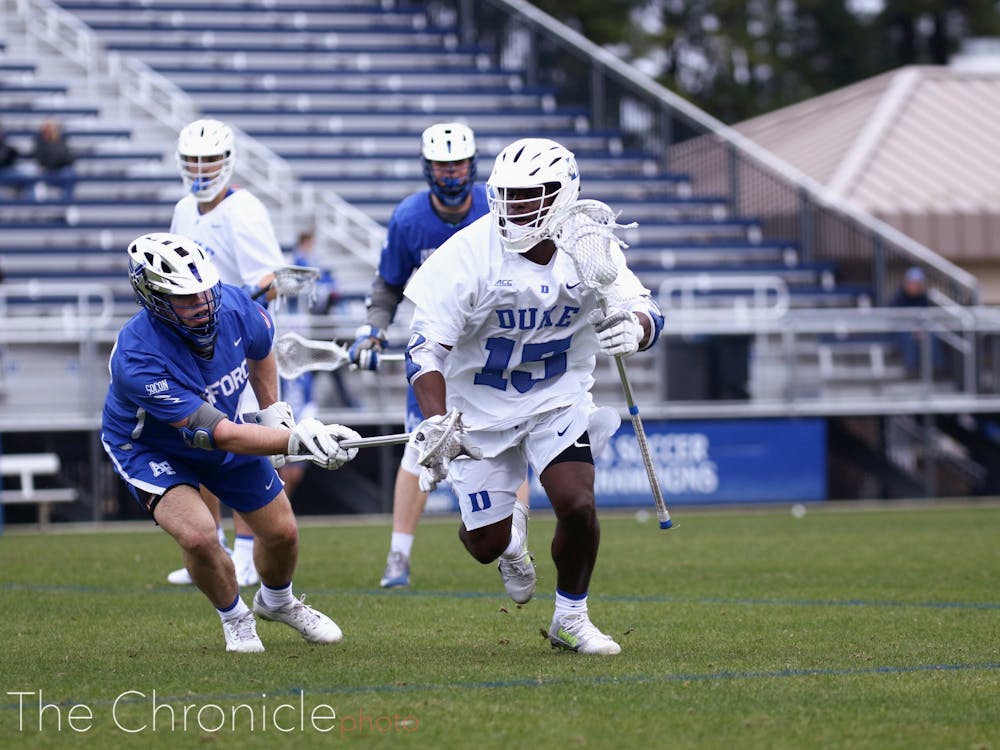It’s no secret among the lacrosse community that Long Island is the sport’s mecca. It’s fitting, then, that Duke traveled to Levittown, N.Y., and played its biggest nonconference game on the island.
Taking on then-No. 11 Penn at MacArthur High School, the then-seventh-ranked Blue Devils fell 14-13 in sudden-death overtime after they couldn’t quite figure out how to quell the Quakers’ meticulous style of lacrosse.
While the Blue Devils’ modus operandi Saturday was unleashing as many shots as possible on as many possessions as possible, the Quakers had a different, sneakier approach. Duke (5-2) finished with a significant edge in almost every meaningful statistic, but Penn capitalized on almost all of their opportunities with surgical precision, and nowhere was that clearer than on Penn junior James Shipley’s goal to tie it at 13 with two seconds left in regulation.
After a Duke shot clock violation gave the Quakers (1-1) possession with a minute left in the fourth quarter, they patiently passed the ball around the outside of the attack area, waiting out Duke’s aggressive defense. Then, Shipley found a small space to slide just a few feet closer to the cage, where he sniped one past Blue Devil goalie Mike Adler, sending the game to overtime.
Sophomore Jake Naso won the opening faceoff to give Duke possession at the start of the extra period, but for the first minute graduate midfielder Nakeie Montgomery held onto the ball to kill off Penn’s man-up opportunity following a Duke penalty on the last possession of regulation. While the Blue Devils were able to get three shots in overtime and forced a turnover to keep the Quakers from meaningful possession until under a minute left, between Penn goalie Patrick Burkinshaw being on his game and some key miscalculations by Duke, it was the Quakers who got the golden goal in the end.
Going on the offensive after another shot clock violation from the Duke, Penn’s Jack Schultz carried the ball in from the sideline, beating graduate midfielder Gavin Lindsay to get right to the crease and snap the ball into the top right corner of the goal over Adler’s shoulder. Such was the end of the Long Island Metro Cup.
However, while the end wasn’t to the Blue Devils’ advantage, there was much to like about the lead-up. Duke seemed in control for much of regulation, and it ultimately finished the game with 51 shots to Penn’s 35, 37 ground balls to Penn’s 19, 17 faceoff wins to Penn’s 12 and seven caused turnovers to Penn’s three. The Quakers played a particularly conservative defensive game which effectively took the Duke attackmen out of the equation, but that let the midfield unit shine.
Eight of the Blue Devils’ 13 goals were scored by midfielders, including a hot start of two in the first period from freshman Andrew McAdorey, the second-ranked recruit of the Class of 2021. However, the star of the show was Montgomery.
The Dallas native scored his first goal with 58 seconds left in the first, attacking from the right wing, dodging his defender and deking Burkinshaw. He then repeated that exact play three more times throughout the contest to pot four total goals, as well as two assists. Overall, the 2021 consensus First-Team All-American demonstrated the speed and agility that landed him on this season’s Tewaaraton Award watchlist.
Beyond having to take a different scoring approach, the Blue Devils also had to combat Penn’s aggressive ride. While Duke ultimately went 19-of-23 on clears, that was not for lack of trying on the Quakers’ part. This forced Duke to get creative in the midfield and limited its ability to score in transition. The Blue Devils’ answer for this was to get set in the attack area and stay there, passing just a few times before attacking the net or taking a powerful shot from outside.
Meanwhile, Penn was much more patient with their limited opportunities, waiting for the perfect shot or scoring quickly off the draw. This strategy ultimately worked, but Duke’s defense for much of the game was stifling. A handful of Quaker possessions didn’t even lead to a shot as the Blue Devils forced the Penn offense outside where they often turned it over. When Penn didn’t turn it over, though, it was precise with how it picked apart Duke’s defense to create brief, but pivotal openings.
The rest of Duke’s nonconference slate should not pose as much of a challenge as this very tight Penn team, but the experience of taking the No. 11 team to overtime will hopefully help the Blue Devils as they prepare for conference play, where they will more likely than not only play in highly-ranked matchups.
Get The Chronicle straight to your inbox
Sign up for our weekly newsletter. Cancel at any time.

Sasha Richie is a Trinity senior and a sports managing editor of The Chronicle's 118th volume.

